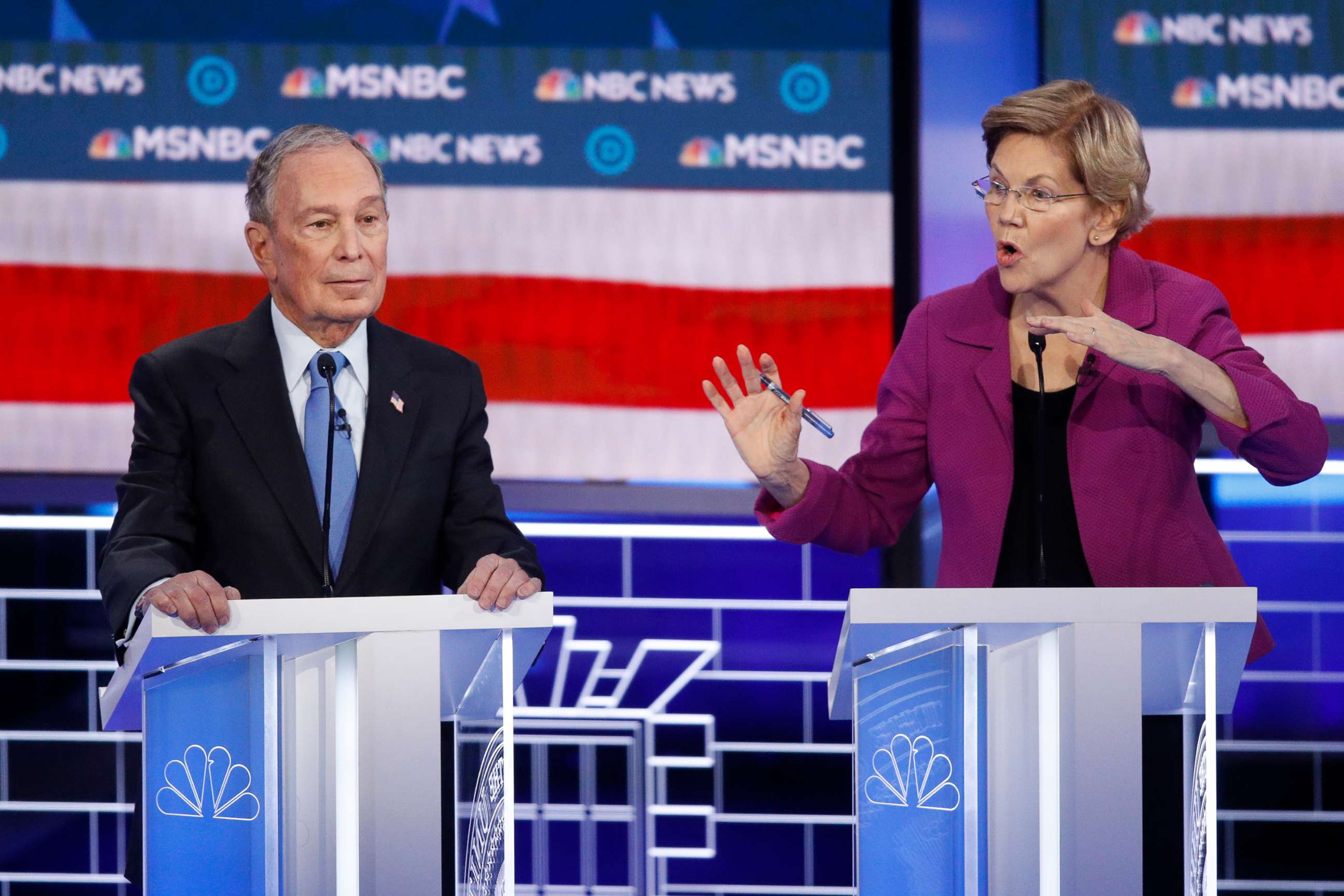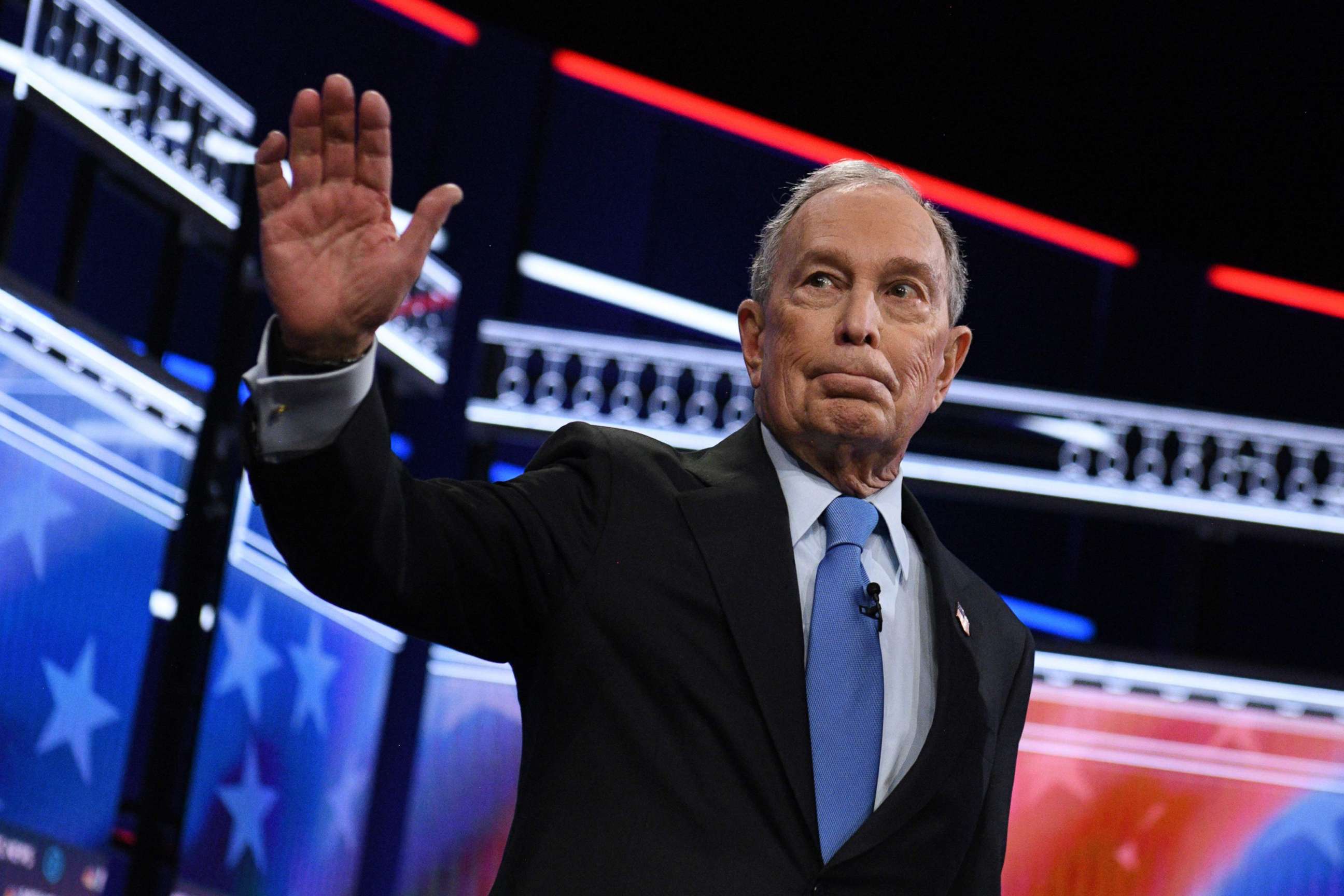In #MeToo era, Bloomberg's comment 'they didn't like a joke I told' could strike a nerve: Experts
As his poll numbers have soared, so has scrutiny of his past.
His own alleged words have dogged him for decades: Mike Bloomberg has on repeated occasions faced and fought allegations that he has made crude, sexist comments to female employees in his employ.
As his poll numbers have soared, so has scrutiny of his past, under national spotlight. And, as verbal volleys flew at Wednesday night’s fiery Democratic debate, his rivals seized on an issue that may prove an open, vulnerable flank for his candidacy: his past treatment of women.
"I have no tolerance for the kind of behavior the "Me too" movement has exposed," Bloomberg said. "And anybody that does anything wrong in our company, we investigate it, and if it's appropriate, they're gone that day,” Bloomberg said, going on as he has prior to tout his company’s record empowering women.
“Lots and lots of women have big responsibilities," he continued. “I am very proud of the fact that about two weeks ago, we were awarded -- we were voted the most -- the best place to work, second-best place in America. If that doesn't say something about our employees and how happy they are, I don't know what does."
“I hope you heard what his defense was: ‘I’ve been nice to some women.’ “That just doesn’t cut it,” Massachusetts Sen. Elizabeth Warren shot back. “We need to know exactly what’s lurking out there.”
“We have a very few nondisclosure agreements --” Bloomberg defended.
“ -- How many is that?” Warren pressed, interrupting him.
“None of them accuse me of doing anything other than, maybe, they didn't like a joke I told,” Bloomberg said, to audible groans from the audience.

In the wake of the #MeToo era, it’s a tone which risks striking as discordant among female voters, experts say.
“I think he got a very rude awakening,” Kelly Dittmar, professor of political science at Rutgers University-Camden and a scholar at the Center for American Women and Politics, told ABC News. “Had we been having this conversation around NDA's maybe eight years ago or even even four years ago - prior to the #MeToo era - maybe there would have been less of an impact. Because people might not have been as aware about what these NDA's often mean for women. But in this moment - in a democratic debate - certainly the audience, you heard them grumble audibly when he said "I'm doing this to protect the confidentiality of women." That was not, you know, most everybody knew that that was not the case.”
Bloomberg has faced pressure to release his employees - Warren often leading that rhetorical charge; Wednesday night, he continued his refusal to do so. His record and current stance combined - offer an easy cudgel for his primary opponents looking to beat him out.

“If Bloomberg felt like he had nothing to worry about personally in these NDAs, then that's all he had to do… now he raises even more questions about what he's hiding,” Dittmar said - and, that can mobilize the voter base already incensed about the White House’s current occupant, who faces multiple allegations of sexual misconduct himself.
Warren can take the opportunity to villainize someone like Bloomberg, making him into a figurehead for systemic ills, she added.
“I'd like to talk about who we're running against. A billionaire who calls women fat broads and horse-faced lesbians, and no I'm not talking about Donald Trump, I'm talking about Mayor Bloomberg,” Warren said during the debate to audible gasps in the debate hall, alluding to the slew of recent stories on the mistreatment of women in the workplace at Bloomberg’s companies.
Such salvos are problematic for Bloomberg, Dittmar said.
“Candidates like Warren who are able to stand on that argument because she hasn't had allegations against her, can stoke that anger - and really move it beyond Mike Bloomberg - saying this is a bigger problem, it's about changing the power dynamics within all our institutions,” Dittmar said.
And that can prove a major liability, especially for the candidate pitching himself as the adult in the room, and the strongest option to beat President Trump.
“I certainly don't see him overcoming this issue unless he actually responds in a way that is either apologetic or transparent,” Dittmar said. “So, either taking culpability for his own actions and saying he was wrong, or at least being transparent and releasing women from the NDA's. Or it just doesn’t resolve.”
An even greater potential risk, Dittmar added, for the Democratic party now working overtime to contrast themselves with Trump, as voters weigh each candidate’s credentials.
It's an attack unlikely to see ceasefire on the 2020 stage, as long as Bloomberg stands on it.
" I think what Democrats want is somebody who takes responsibility, someone who is honest and says that there are things that he has said in his life that he regrets," Bloomberg senior advisor Howard Wolfson said after the debate. "Nobody is perfect. But if you look at the kind of workplace that he has built over the years of his business and city hall, it is an inclusive workplace that values everyone. And that’s the kind of president he’d be."
"We knew that we were going to come in -- the opponents were loaded -- he was everyone’s target," Wolfson continued. "I think he weathered the storm."
Warren herself has attempted to align Bloomberg with Trump in her attacks on him.
“The Democrats have to pick the person who has the best possible chance at beating Donald Trump.. It's about who's going to be able to do that,” she said Thursday on The View, adding that “the American people are not going to take kindly" to Bloomberg’s comments about women, adding that she feels he is a "risky candidate" to choose.
"We need someone with rock solid values who has a history of getting change done...That's why I'm in this race."
Taking this position as a rival candidate can prove a double-edged sword, however.
“When Hillary Clinton continued to go after Trump on misogyny, it didn’t land. It’s not always a slam dunk to attack men on these issues, because there are people who will defend them and say, oh yeah he was just joking, you all take it too seriously.”
Voters' responses are varied.
"You know, I think it's being blown out of proportion," Mary Donovan said at Bloomberg's rally in Salt Lake City Thursday.
Donovan and Bloomberg go way back: she worked with him early on in his career at Soloman Brothers; now, she supports his candidacy.
"Especially back then in the 70s, it was a tough place for women to work. There were very few that were in positions of influence," Donovan continued, saying that now, perhaps, times had changed, and perception towards his alleged words - especially the more recent ones - has, too.
"I guess people are more awake but when I worked there, it was all about not letting anybody see that you were upset or bothered by anything... I think he's got to be more prepared to answer those questions in a convincing manner. I felt he stumbled last night badly over that," she said.
Others aren't as forgiving.
"I could definitely see it as a problem, maybe. I would say," Jace Hoskin said. "Just the more transparency, the more he's willing to be open and explain things. I feel like that would definitely help with this situation. Yeah, I would."
Still others - felt the focus of all candidates concerned should not be on inter-campaign criticism - but on coming together as a party.
"I rather judged the fact that everyone attacked him," Carolyn Connell, a Warren supporter, said. "And it bothers me greatly that the candidates right now are attacking each other when we need to be concentrating on unity."
ABC News' Ben Siegel contributed to this report.




